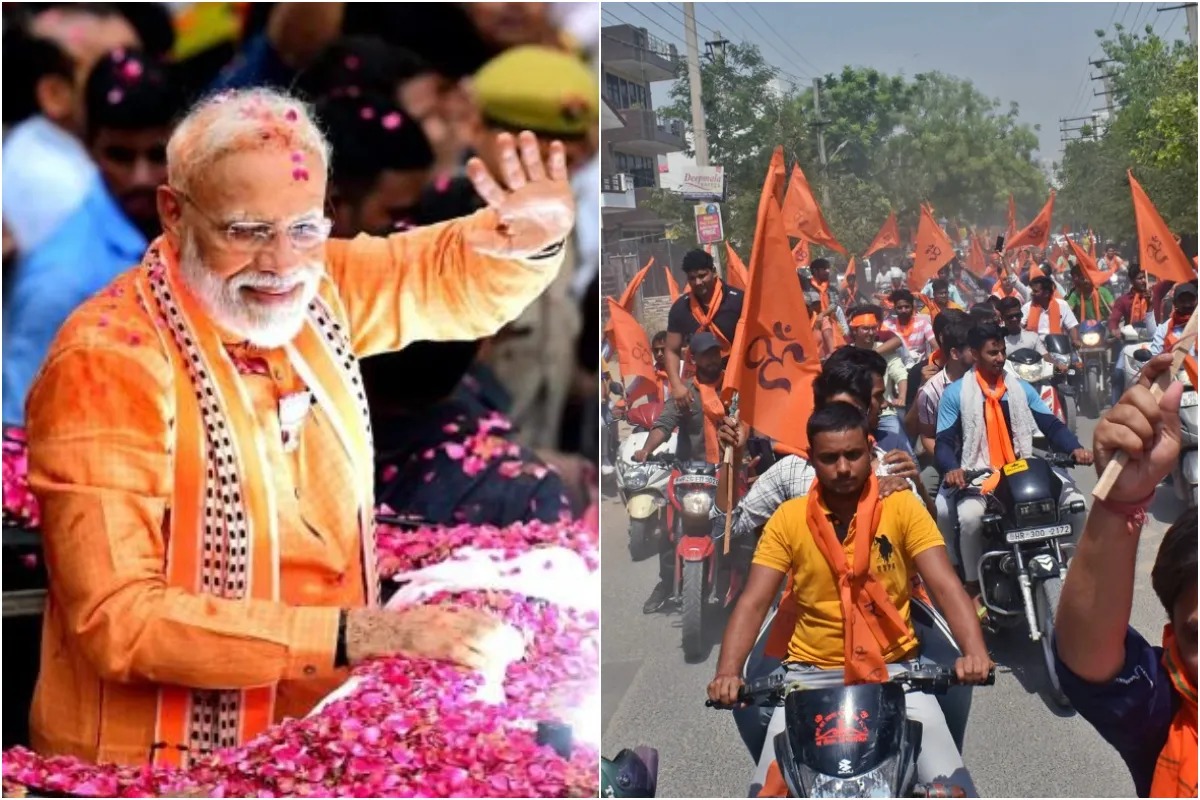
In the politics of the country, the manifestos of political parties are a part of the electoral strategy, but it seems that this strategy of the Congress has backfired in Karnataka. The claim made by Congress in its manifesto to ban Bajrang Dal with all other promises is becoming trouble for them. On top of this, the way Congress has already linked the banned PFI with the Bajrang Dal, has added fuel to the fire. Now it is becoming difficult for the party to answer the questions being asked on this. Due to this, on the one hand, its well-running election campaign seems to be derailed, and on the other hand, the BJP, which has been on the defensive till now, has got an opportunity to be aggressive. Especially the way Prime Minister Narendra Modi has made it an issue, it has become a lifeline for the BJP which was looking breathless. It is also interesting that till now it is Congress that has been accusing the BJP of polarizing the elections. Now it itself has given the opponent a chance to play on its pitch.
Was it necessary to compare Bajrang Dal with a terrorist organization like PFI? Everyone knows that PFI is a banned organization. People who have worked in SIMI and are involved in terrorist activities against the country have been its members. The PFI itself was accused of conspiring against the country and colluding with terrorist organizations. The country’s highest investigating agency NIA had revealed that PFI was funding to establish Ghazwa-e-Hind. In the NIA raid in Patna, evidence of conspiracies to make India an Islamic nation, such as literature related to anti-national activities and different flags, were found from a PFI hideout, after which the PFI was banned. Its role in the Hijab controversy and the murder of a Hindu activist is under scrutiny in the land of Karnataka where elections are scheduled.
On the other hand, of course, Bajrang Dal has also been a controversial organization. After the demolition of the Babri Masjid, the Narasimha Rao government banned it. However, after about a year, this ban was lifted as its role was not proven. Bajrang Dal has been very active in matters ranging from love jihad, religious conversions to cow slaughter in the country. The people of this organization have also been found doing moral policing on many occasions like Valentine’s Day, when they have also been accused of misbehaving with the public. But in spite of all this, no allegation of anti-national work on Bajrang Dal has been proven.
Keeping the logic and arguments aside, the question is that what electoral advantage did Congress see in Karnataka with an 80 percent Hindu population that it asked to ban the same organization which has been advocating for the majority of the people of the state? It seems to be an attempt to attract the Muslim voters of the state, as if Congress is trying to give a message that if the Center has banned PFI, then we are equalizing the issue by banning Bajrang Dal. There are about 13 per cent Muslim voters in Karnataka, who decide the difference between victory and defeat in 40 seats. Although Muslim voters are present in all districts of Karnataka, they are in decisive numbers in areas of North Karnataka like Gulbarga, Bidar, Bijapur, Raichur, and Dharwad. Similarly Kalburgi-North, Pulakeshinagar, Shivajinagar, Jayanagar, and Padmanabhanagar Tumkur, Chamarajpet are some other constituencies where Muslim voters are in the majority. Till now their vote has been divided between Congress and JDS. Congress is probably thinking that if this vote falls to it outright, then after a long time it can form a majority government in the state, in which there is no danger of rebellion after the elections or there is no dependence on JDS, which may create a chance of horse-trading. Even after forming the government last time, it had to sit in the opposition. As far as disadvantages are concerned, it is also true that Bajrang Dal is not an organization that has a huge support base among Hindus. Coastal Karnataka and South Karnataka may see some impact, but these are areas where Congress’s chances of winning are already slim.
But the big question is about the perception which has changed after this controversy. Even though it is not visible much to the general voters of Karnataka, but after the scathing attack of the BJP under the leadership of the Prime Minister and the Bajrang Dal coming on the road, the Congress is definitely visible on the back foot. In the beginning, this was not the case even till Congress stood firm on its stand. But instead of damage control, Congress is getting dirtier with statements like Veerappa Moily’s U-turn and D Shivakumar’s construction of Bajrang Bali temples across the state. This contradiction was also visible during the Congress government’s tenure from 2013 to 2018 when Chief Minister Siddaramaiah ordered the withdrawal of 176 cases against SDPI and PFI workers. Now the same Congress is considering PFI as a fanatic organization. Such decisions of Congress send a message that its firmness on ideological matters is driven more by electoral gains and losses.
Apart from this controversial issue, there are many things in the manifesto of Congress that do not look normal like the five electoral guarantees given by it. The Congress has named these guarantees Griha Jyoti, Griha Lakshmi, Anna Bhagya, Yuva Nidhi, and Shakti. If the Congress wins the elections and forms the next government in the state, thousands of crores of rupees may be spent from the state exchequer to fulfill its election guarantees. There is no clarity from its side on how Congress will compensate for this. In fact, till now the Congress campaign against corruption in the Bommai government was speaking headlong, so Congress was not being questioned much on this. But now after the controversy over Bajrang Dal, when the balance is leveling in Karnataka, Congress may have to answer on this as well, which can turn into a new problem for it. Although it will be a matter of relief for Congress that this controversy has arisen at a time when there is not much time left for voting, but it is also said in electoral politics that the night before voting is the night of doom. Before that, the next 72 hours of campaigning in Karnataka are going to be very interesting.


















